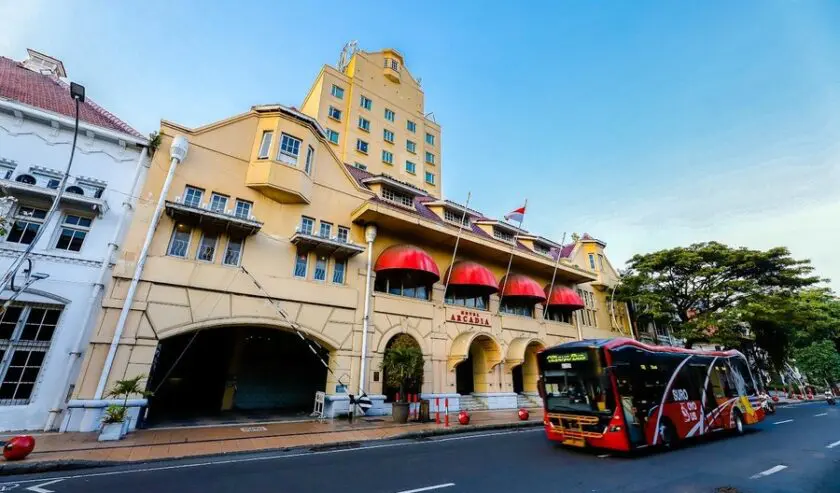A total of 16 medium-sized Suroboyo Bus units have been operating on the Benowo-Tunjungan route since Sunday.
The Acting Head of Surabaya’s Transportation Department stated that these buses are replacing the previous transport service on that route, Wira Wiri.
The replacement with larger vehicles is due to high public demand following an evaluation.
“The Benowo-Tunjungan route was previously served by Hiace (Wira Wiri) vehicles. For about a year, we have studied and evaluated the route, and found that there has been an increase in usage. Due to this high demand, we conducted a transport analysis study, which resulted in the decision to increase seating capacity by changing the type of transport vehicle,” said the official.
Previously, Wira Wiri had a capacity of only 15 people. Now, Suroboyo Bus can accommodate 22 seated passengers and standing space for eight people, bringing the total capacity to 30 passengers.
All services use a by-the-service system and cashless payments.
“Even up to the launch yesterday, passenger demand from residents of Benowo has been very high. So, thankfully it has been successful. This shows that the policy is indeed appropriate and targeted,” they explained.
Meanwhile, the Wira Wiri vehicles that were on the Benowo-Tunjungan route will be reassigned to a new route: Warugunung-Joyoboyo.
“There are no more Wira Wiri vehicles on that route (Benowo-Tunjungan), as we have moved them to another route,” they stated.
Suroboyo Bus
The Suroboyo Bus is a public transportation service introduced in Surabaya, Indonesia, to promote eco-friendly travel. It is notable for its unique payment system, where passengers can pay for their fare by exchanging plastic waste, such as bottles and cups, instead of using money. This initiative, launched by the city government, aims to reduce plastic pollution while providing an affordable and sustainable transport option for residents.
Surabaya’s Old Town
Surabaya’s Old Town, also known as Kota Tua, is the historic colonial heart of Indonesia’s second-largest city. Established during the Dutch East Indies era, the area is characterized by its European-style architecture, including old government buildings, warehouses, and merchant houses. Today, it stands as a testament to the city’s trading past and is a popular area for heritage tourism.
Benowo
I am unable to provide a summary for “Benowo” as it does not appear to be a widely recognized cultural site, landmark, or historical location. The name most commonly refers to a district within the city of Surabaya in Indonesia, which is primarily a residential and industrial area without a prominent global historical or cultural significance attached to it.
Tunjungan
Tunjungan is a major commercial and historic district in Surabaya, Indonesia. Historically, it was the site of a decisive battle in 1945 that helped galvanize Indonesian resistance against colonial forces. Today, it is known for its modern shopping centers, hotels, and as a bustling urban hub.
Wira Wiri
I am unable to provide a summary for “Wira Wiri” as I cannot find any significant cultural, historical, or geographical site with this name. It is possible the name may be misspelled, refer to a very localized or lesser-known place, or be from a specific piece of fiction or local lore not widely documented.
Warugunung
I am unable to provide a summary for “Warugunung” as I could not find any significant cultural, historical, or geographical sites by that name in my knowledge base. It is possible the name is misspelled, refers to a very localized place, or is known by a more common designation. If you have more context, such as the country or region, I would be happy to try again.
Joyoboyo
Joyoboyo refers to the legendary 12th-century King Jayabaya of the Kediri Kingdom in East Java, Indonesia, who is famous for his prophecies (Jangka Joyoboyo). He is a revered figure in Javanese culture, and his predictions about the future of the archipelago are still widely discussed today.
City of Heroes
“City of Heroes” was a popular and influential superhero-themed massively multiplayer online role-playing game (MMORPG) released in 2004. It was celebrated for its deep character customization, allowing players to create unique heroes or villains and fight crime in the fictional Paragon City. The game’s original servers were shut down in 2012, but it was revived by fan-led efforts in 2019 as “City of Heroes: Homecoming,” allowing a new generation of players to experience its iconic superhero gameplay.






